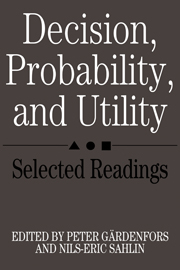Book contents
- Frontmatter
- Contents
- List of contributors
- Preface
- 1 Introduction: Bayesian decision theory – foundations and problems
- Part I Foundations of Bayesian decision theory
- Part II Conceptualization of probability and utility
- Part III Questionable rules of rationality
- Part IV Unreliable probabilities
- 13 Risk, ambiguity, and the Savage axioms
- 14 Self-knowledge, uncertainty, and choice
- 15 On indeterminate probabilities
- 16 Unreliable probabilities, risk taking, and decision making
- Part V Causal decision theory
- References
- Name index
- Subject index
14 - Self-knowledge, uncertainty, and choice
Published online by Cambridge University Press: 05 June 2012
- Frontmatter
- Contents
- List of contributors
- Preface
- 1 Introduction: Bayesian decision theory – foundations and problems
- Part I Foundations of Bayesian decision theory
- Part II Conceptualization of probability and utility
- Part III Questionable rules of rationality
- Part IV Unreliable probabilities
- 13 Risk, ambiguity, and the Savage axioms
- 14 Self-knowledge, uncertainty, and choice
- 15 On indeterminate probabilities
- 16 Unreliable probabilities, risk taking, and decision making
- Part V Causal decision theory
- References
- Name index
- Subject index
Summary
This paper takes up some problems in the theory of choice, problems arising from questions of where and when we can choose at all, or see any point in choosing. Some of these problems have a long history, others have come up only lately. The older problems have outstayed their time. They need to be reminded of this and pressed again to retire. The others are elusive and can be troubling. I will try to come to grips with these.
A meta-problem here is how to tie all this together. I shall draw on the fact that it has been done before. The British economist G. L. S. Shackle has linked up much the same issues. Shackle discusses three problems. He holds that some radical steps must be taken in order to get around them. In this last, I think he is wrong, but we needn't stop for that now. We shall set out what follows under Shackle's three problem-headings, and start each time with Shackle himself.
1. Suppose that everything must happen exactly as it does. “ … [S]uppose that history is a book already written, whose pages the hand of fate is merely turning, not composing” (Shackle, 1966, p. 72). What we shall be doing at every moment in our lives is fully noted in the book. In a world of the sort described, can we choose what we do? Shackle says that we can't.
- Type
- Chapter
- Information
- Decision, Probability and UtilitySelected Readings, pp. 270 - 286Publisher: Cambridge University PressPrint publication year: 1988
- 2
- Cited by



